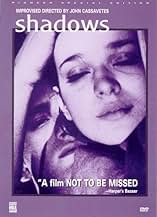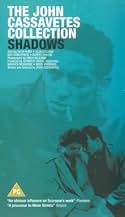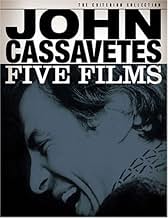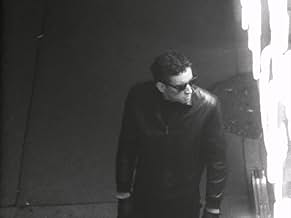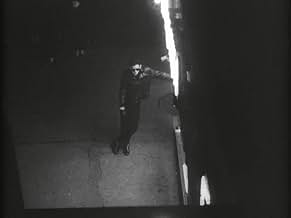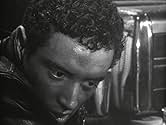CALIFICACIÓN DE IMDb
7.2/10
13 k
TU CALIFICACIÓN
En la Nueva York de los 50, exploramos las amistades interraciales de la época del Beat.En la Nueva York de los 50, exploramos las amistades interraciales de la época del Beat.En la Nueva York de los 50, exploramos las amistades interraciales de la época del Beat.
- Dirección
- Guionistas
- Elenco
- Nominada a4premios BAFTA
- 2 premios ganados y 5 nominaciones en total
David Jones
- Davey
- (as Davey Jones)
- Dirección
- Guionistas
- Todo el elenco y el equipo
- Producción, taquilla y más en IMDbPro
Opiniones destacadas
Shadows breathes the smell of New York's streets like no film before it. This kick off of Cassavetes' directorial work is as atmospheric as political and the initial spark for a renewal in American cinema.
Maybe it solicits for watching Cassavetes' first work in a double feature with another debut, Godard's À bout de soufflé. Both films shaped the cinematic production of their countries beyond decades and both breathe a peculiar lightness and jauntiness which was later rarely achieved by those filmmakers in their career.
Shadows tells from three Afro-American siblings, Ben (Ben Carruthers), Lelia (Lelia Goldoni) and Hugh (Hugh Hurd). The story is set in the New York jazz milieu and the driving rhythms on the soundtrack play a main part for the feverish, sometimes almost dreamlike atmosphere which draws through the entire film. There's not much happening in the plot. The everyday life of the three siblings is defined by problems in love relationship or in their jobs, but on both levels normality deceives. Without moralizing gestus, Cassavetes simply describes the mechanism of racial exclusion, in public and in private life. It was, regarding to the cinematic depiction of racism, a breakthrough film in the US.
This film owes also a lot to the performances of the three leading actors which were all almost completely unknown before. Especially Ben Carruthers established with his energetic portrayal the image of a new self-conception of young, urban blacks in America, an image which characterizes Spike Lee's films of the 80s and 90s. Revealingly, none of those three doubtlessly extremely talented actors was able to start a big career afterwards. Hollywood wasn't and isn't ready to ethnically expand its star system, and that is why Goldoni, Hurd and Carruthers only found small artistic niches in TV and independent films later on.
Perhaps Shadows is one of the less "beautiful" films ever shot, and one of the most beautiful ones at the same time; a film of shades and spaces, with a camera that merely watches the stream of life in the crowded street corners, bars, hotel lobbies, apartments, inducing an intriguing ramble through New York's vibrant streets.
Maybe it solicits for watching Cassavetes' first work in a double feature with another debut, Godard's À bout de soufflé. Both films shaped the cinematic production of their countries beyond decades and both breathe a peculiar lightness and jauntiness which was later rarely achieved by those filmmakers in their career.
Shadows tells from three Afro-American siblings, Ben (Ben Carruthers), Lelia (Lelia Goldoni) and Hugh (Hugh Hurd). The story is set in the New York jazz milieu and the driving rhythms on the soundtrack play a main part for the feverish, sometimes almost dreamlike atmosphere which draws through the entire film. There's not much happening in the plot. The everyday life of the three siblings is defined by problems in love relationship or in their jobs, but on both levels normality deceives. Without moralizing gestus, Cassavetes simply describes the mechanism of racial exclusion, in public and in private life. It was, regarding to the cinematic depiction of racism, a breakthrough film in the US.
This film owes also a lot to the performances of the three leading actors which were all almost completely unknown before. Especially Ben Carruthers established with his energetic portrayal the image of a new self-conception of young, urban blacks in America, an image which characterizes Spike Lee's films of the 80s and 90s. Revealingly, none of those three doubtlessly extremely talented actors was able to start a big career afterwards. Hollywood wasn't and isn't ready to ethnically expand its star system, and that is why Goldoni, Hurd and Carruthers only found small artistic niches in TV and independent films later on.
Perhaps Shadows is one of the less "beautiful" films ever shot, and one of the most beautiful ones at the same time; a film of shades and spaces, with a camera that merely watches the stream of life in the crowded street corners, bars, hotel lobbies, apartments, inducing an intriguing ramble through New York's vibrant streets.
1959 was a landmark in the world of film. Several great directors of the classic era were releasing career capping classics that ranked among their best. Just a look at the titles is instructive, Hitchcock's North By Northwest, Billy Wilder's Some Like It Hot, Howard Hawks' Rio Bravo, Douglas Sirk's Imitation of Life. Add a couple from the previous year, Orson Welles' Touch of Evil, Hitch's Vertigo, and Nick Ray's Wind Across the Everglades, and you've got a pretty good summing up of what was possible within the classic Hollywood style.
At the same time, two films appeared that hinted at a whole new way of making films. One was Jean-Luc Godard's Breathless, the other was John Cassavetes Shadows. The two films had certain things in common, largely improvised acting by non stars, handheld cameras, low budgets, and a certain youthful, jazzy swagger. In certain ways, though, they couldn't be farther apart. Godard was still a believer in the director as arbiter of style. He knew more about film than most Hollywood producers, and Breathless was filled with the iconography of the classic crime film. Cassavetes, on the other hand, was an actor, and a refugee from New York's underground theater scene. His first film shows him little impressed with the cinema, and a big believer in actors. Godard's film constantly references it's own artifice, whereas Shadows aims for a certain kind of naturalism.
It doesn't reach it, mainly because naturalism is a myth, particularly in cinema. But it feels powerful, kinetic but lilting like the cool jazz on the score, certainly the main inspiration for the filmmaking style on display here. It ultimately doesn't hold together, mainly because Cassavetes' actors here are amateurish beatniks, where Cassavetes style requires strong, imaginative actors. His later work with Gena Rowlands, Ben Gazarra, and Peter Falk blows this out of the water. Due to the director's technical inexperience, some bits of dialogue had to be redubbed later, which defeats the freshness of the improvisation. Still it's fascinating to watch, both for the great moments (like the scene where Leila Goldoni talks about her dissapointment with losing her virginity) and to watch a groundbreaking artist finding his way.
At the same time, two films appeared that hinted at a whole new way of making films. One was Jean-Luc Godard's Breathless, the other was John Cassavetes Shadows. The two films had certain things in common, largely improvised acting by non stars, handheld cameras, low budgets, and a certain youthful, jazzy swagger. In certain ways, though, they couldn't be farther apart. Godard was still a believer in the director as arbiter of style. He knew more about film than most Hollywood producers, and Breathless was filled with the iconography of the classic crime film. Cassavetes, on the other hand, was an actor, and a refugee from New York's underground theater scene. His first film shows him little impressed with the cinema, and a big believer in actors. Godard's film constantly references it's own artifice, whereas Shadows aims for a certain kind of naturalism.
It doesn't reach it, mainly because naturalism is a myth, particularly in cinema. But it feels powerful, kinetic but lilting like the cool jazz on the score, certainly the main inspiration for the filmmaking style on display here. It ultimately doesn't hold together, mainly because Cassavetes' actors here are amateurish beatniks, where Cassavetes style requires strong, imaginative actors. His later work with Gena Rowlands, Ben Gazarra, and Peter Falk blows this out of the water. Due to the director's technical inexperience, some bits of dialogue had to be redubbed later, which defeats the freshness of the improvisation. Still it's fascinating to watch, both for the great moments (like the scene where Leila Goldoni talks about her dissapointment with losing her virginity) and to watch a groundbreaking artist finding his way.
Like all Cassavetes, Shadows makes every movie in recent memory seem irrelevant to your life and how to live it. The theme of 1959's Shadows centers around race and its effects on relations between men and women. As in life, this falls a distant second to the theme of the pervasive and exhausting need for love. Shadows is often billed as the story of a 'black woman who passes as white.' Cassavetes' film illustrates how these stark delineations between races harms those who exist in the shadows in-between. Lelia is a light-skinned part-African woman in New York who falls for an infantile racist white man. When Lelia's boyfriend meets her darker brother Hugh, her lover's true colors are revealed. Hugh is a dignified and caring protector who refuses to let racism erode his positive nature, though he faces blatant economic persecution in his work. Lelia's second brother, a charismatic jazz musician played by the beautiful Benito Carruthers, is also light-skinned. We painfully watch as his displacement in both 'white' and 'black' social groups gives rise to self-loathing and isolation. Ben wandering New York alone, hiding behind a series of dark sunglasses, is an enduring image from the film. One crushing scene shows Ben promising Lelia's lover that he will convey the sickly reasoning behind the rejection to his sister. Ben's palpable pain is relevant to people of every 'shade.' The dismissal of the possibility of love, based solely on race or other peripheral facts, is tragic across the whole spectrum of social relationships.
In the end credits of "Shadows", after we read 'directed by John Cassavetes', some white letters on the screen can be seen: "The film you have just seen is improvised", they say. I am always pursuing the fact that words are so important in movies since filmmakers started using them because, basically, there's no film without a screenplay and many other reasons.
Cassavetes pursued the same goal, and he believed in the freedom of words; "Shadows" is the perfect example. It's a film with no real main characters, with no real main plot lines; it's mostly people in different situations, talking. Yes, some of the situations are connected but Cassavetes, apparently always in a rush to get to the talking, uses a fast forward technique when the characters are going somewhere or escaping from someone and are not speaking.
Appearances are everything in this movie. For example, there's a brilliant score, full of jazz influences and a lot of fantastic solos, and there's one character that says he's a jazz musician and plays the trumpet (Ben, all the characters' names are the same names the actors'). However, we never see him play the trumpet or jam with a band; he doesn't even talk about music and just wanders with his friends around the city. They do talk, a lot, and about anything that's in their minds; going from how intelligent each of them are to the hilarious analysis of a sculpture.
"Shadows" is funny in its intellectual references in parts like the one above, because these friends are not cultured. The only important female character in the film (Lelia), though, wants to be an intellectual. But again, she has one very interesting conversation with an older man at a party, about a book she's trying to write, and about how to confront reality; but nothing to do with being intellectual. At that same party, a woman is actually making an intellectual statement, full of complexity, and asks a guy beside her: "Do you agree?". "Yes", he says, but you can tell he doesn't know what she's talking about.
Another character, a singer (Hugh), talks about his glory days in occasions, and we see him perform only once; but no references to the musical industry there. The focus of Cassavetes is the singer's relationship with his manager (Rupert), which most of the time involves chats about trivial stuff and not real 'musical' talks. So the trumpet player's important deal in "Shadows" is the time he spends with his friends; the intellectual wannabe girl's is her way of handling romantic relationships (one of the movie's strong points) and the singer's is the bond with his manager Appearances.
The reason why performances are not important in this movie is simple. Cassavetes needed people who could master improvisation, without mattering if they were actually good. I believe some of them aren't, but they surely know how to improvise in a scene, and you can notice how well they do it. "Shadows" is not about performers; it's about a way of making cinema, based on the magic of conversation; and there you could say that performances mean something.
That's why in every conversation the camera is like a stalker, constantly on the eyes of every character, constantly looking for the expressions that come with natural speech. There's a scene where the trumpet player and his friends are trying to pick up some girls. They are three, so each of them sits beside one girl (the girls are three two) in three different tables. They all talk at the same time and the camera shoots through the table, and sometimes the friends look at each other, while they say whatever they are saying It's natural.
Cassavetes pursued the same goal, and he believed in the freedom of words; "Shadows" is the perfect example. It's a film with no real main characters, with no real main plot lines; it's mostly people in different situations, talking. Yes, some of the situations are connected but Cassavetes, apparently always in a rush to get to the talking, uses a fast forward technique when the characters are going somewhere or escaping from someone and are not speaking.
Appearances are everything in this movie. For example, there's a brilliant score, full of jazz influences and a lot of fantastic solos, and there's one character that says he's a jazz musician and plays the trumpet (Ben, all the characters' names are the same names the actors'). However, we never see him play the trumpet or jam with a band; he doesn't even talk about music and just wanders with his friends around the city. They do talk, a lot, and about anything that's in their minds; going from how intelligent each of them are to the hilarious analysis of a sculpture.
"Shadows" is funny in its intellectual references in parts like the one above, because these friends are not cultured. The only important female character in the film (Lelia), though, wants to be an intellectual. But again, she has one very interesting conversation with an older man at a party, about a book she's trying to write, and about how to confront reality; but nothing to do with being intellectual. At that same party, a woman is actually making an intellectual statement, full of complexity, and asks a guy beside her: "Do you agree?". "Yes", he says, but you can tell he doesn't know what she's talking about.
Another character, a singer (Hugh), talks about his glory days in occasions, and we see him perform only once; but no references to the musical industry there. The focus of Cassavetes is the singer's relationship with his manager (Rupert), which most of the time involves chats about trivial stuff and not real 'musical' talks. So the trumpet player's important deal in "Shadows" is the time he spends with his friends; the intellectual wannabe girl's is her way of handling romantic relationships (one of the movie's strong points) and the singer's is the bond with his manager Appearances.
The reason why performances are not important in this movie is simple. Cassavetes needed people who could master improvisation, without mattering if they were actually good. I believe some of them aren't, but they surely know how to improvise in a scene, and you can notice how well they do it. "Shadows" is not about performers; it's about a way of making cinema, based on the magic of conversation; and there you could say that performances mean something.
That's why in every conversation the camera is like a stalker, constantly on the eyes of every character, constantly looking for the expressions that come with natural speech. There's a scene where the trumpet player and his friends are trying to pick up some girls. They are three, so each of them sits beside one girl (the girls are three two) in three different tables. They all talk at the same time and the camera shoots through the table, and sometimes the friends look at each other, while they say whatever they are saying It's natural.
This is a great movie. Like it was made yesterday. Punk, beat in sensibility. About young people struggling on the fringes.
But I am mainly writing to mention that a guy named Ray Carney just wrote an astonishing book about the movie that has incredible behind the scenes details that no one ever knew before. I HIGHLY recommend it.
Cassavetes revealed things to Carney before he died in a Rosebud conversation that he had never told anyone about the film--like the fact that most of it was scripted and not improvised as the final title indicates. The book is titled Shadows and is available in any well stocked store. Carney is also the author of another WONDERFUL book titled Cassavetes on Cassavetes. Carney also has a web site that you should check out with lots of other Cassavetes material. The site is accessible from any search engine--if you type in Cassavetes' name--if you want to read even more behind the scenes stories about how Shadows and the other films were made.
But I am mainly writing to mention that a guy named Ray Carney just wrote an astonishing book about the movie that has incredible behind the scenes details that no one ever knew before. I HIGHLY recommend it.
Cassavetes revealed things to Carney before he died in a Rosebud conversation that he had never told anyone about the film--like the fact that most of it was scripted and not improvised as the final title indicates. The book is titled Shadows and is available in any well stocked store. Carney is also the author of another WONDERFUL book titled Cassavetes on Cassavetes. Carney also has a web site that you should check out with lots of other Cassavetes material. The site is accessible from any search engine--if you type in Cassavetes' name--if you want to read even more behind the scenes stories about how Shadows and the other films were made.
¿Sabías que…?
- TriviaThis caused a stir as it fairly explicitly showed an unmarried couple in a post-coital position and its suggestion that a young woman would actively seek out sex.
- ErroresWhen Tony takes Lelia back to her apartment, Ben, Dennis, and Tom are sitting around the table playing poker and trying to arranges some dates. All three bear the marks of a fight that won't take place until near the end of the movie.
- Créditos curiosos"Presented by Jean Shepherd's Night People"
- Versiones alternativasCassavetes screened a finished version of Shadows in 1957 and 1958 that ran 78 minutes. Part of the original negative of this version was used for the 1959 version, which was completely re-shot with new actors. In 2002, Prof. Ray Carney of Boston University discovered the only remaining 16mm copy of this earlier version.
- ConexionesFeatured in Cinéastes de notre temps: John Cassavetes (1969)
- Bandas sonorasBeautiful
Written by Jack Ackerman, Hunt Stevens and Eleanor Winters
Selecciones populares
Inicia sesión para calificar y agrega a la lista de videos para obtener recomendaciones personalizadas
- How long is Shadows?Con tecnología de Alexa
Detalles
Taquilla
- Presupuesto
- USD 40,000 (estimado)
- Total a nivel mundial
- USD 2,729
- Tiempo de ejecución
- 1h 21min(81 min)
- Color
- Mezcla de sonido
- Relación de aspecto
- 1.37 : 1
Contribuir a esta página
Sugiere una edición o agrega el contenido que falta




